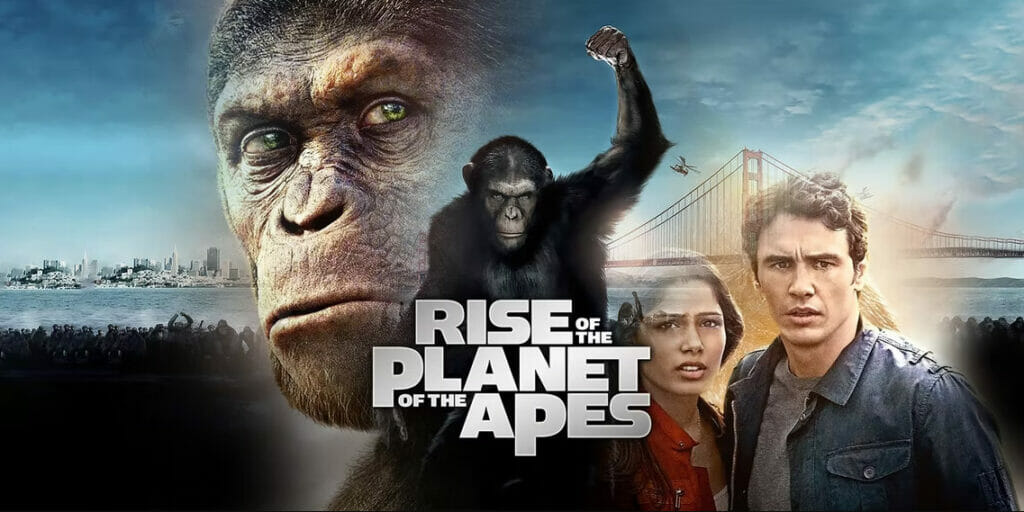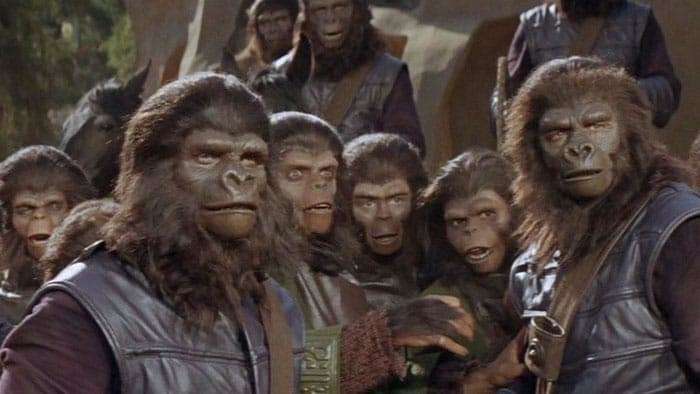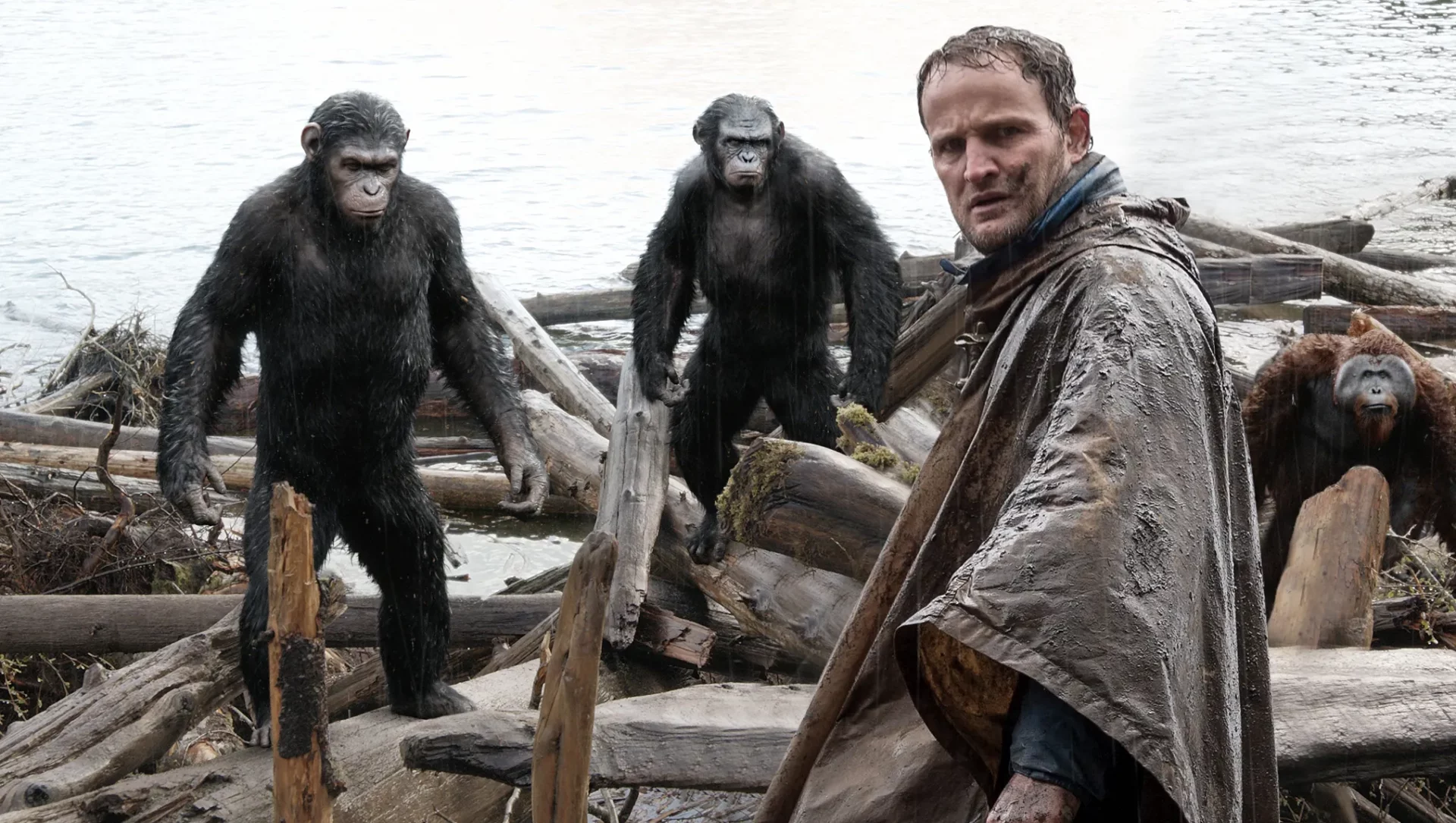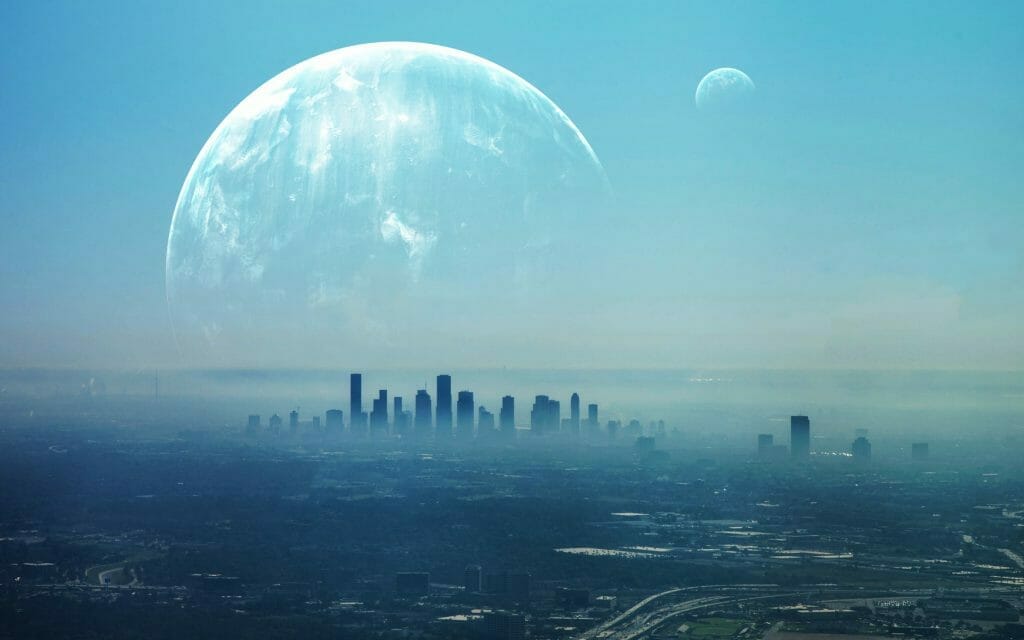Introduction
In the world of science fiction cinema, few franchises have captured the imaginations of audiences quite like the “Planet of the Apes” series. With its iconic imagery and thought-provoking themes, this film saga has left an indelible mark on the genre. Over the years, the franchise has evolved, expanding its universe through sequels, prequels, and reboots, offering viewers a unique opportunity to delve into the complexities of society, evolution, and the human condition. In this blog post, we’ll take a journey through the “Planet of the Apes” movies in chronological story order, exploring the profound questions they raise about our own humanity.
“Rise of the Planet of the Apes” (2011)

Our journey begins with “Rise of the Planet of the Apes,” a reboot that explores the origins of the ape civilization. Set in contemporary San Francisco, the film follows the story of Dr. Will Rodman (played by James Franco), a scientist seeking a cure for Alzheimer’s disease. Rodman’s experiments led to the birth of Caesar, a highly intelligent chimpanzee, portrayed through groundbreaking motion-capture technology by Andy Serkis. As Caesar matures and gains human-like intelligence, he becomes a symbol of hope for oppressed apes everywhere.
The film raises questions about ethics in scientific experimentation, the consequences of human actions on the animal kingdom, and the potential for the oppressed to rise against their oppressors. It sets the stage for the complex moral dilemmas that the franchise will continue to explore.
“Dawn of the Planet of the Apes” (2014)
In the sequel, “Dawn of the Planet of the Apes,” the ape civilization led by Caesar has evolved significantly. Meanwhile, humanity has been decimated by a deadly virus. The film explores the struggle for coexistence between apes and surviving humans, as well as the growing rift between those who seek peace and those who desire war.
“Dawn” delves into themes of diplomacy, trust, and the consequences of prejudice and fear. It paints a grim picture of the fragile balance between two intelligent species, highlighting the ever-present risk of conflict when misunderstanding and mistrust prevail.
“War for the Planet of the Apes” (2017)
The trilogy reaches its climax in “War for the Planet of the Apes.” Caesar, now an iconic character in the franchise, faces a formidable human antagonist known as the Colonel (played by Woody Harrelson). The film explores themes of revenge, sacrifice, and the ultimate survival of the fittest.

“War” takes us on an emotional rollercoaster, showcasing the lengths to which both apes and humans will go to protect their kind. It raises questions about the dark side of humanity and the capacity for violence in the face of perceived threats.
“Planet of the Apes” (1968)
After concluding the reboot trilogy, it’s time to explore the original classic, “Planet of the Apes,” released in 1968. Directed by Franklin J. Schaffner and starring Charlton Heston, the film takes us to a world where Earth has been replaced by a planet ruled by intelligent apes, while humans have become mute, primitive creatures.

This film serves as a cultural touchstone, raising profound questions about societal hierarchy, the potential consequences of environmental degradation, and the limits of human arrogance. The iconic twist ending has become one of cinema’s most celebrated moments.
“Beneath the Planet of the Apes” (1970)
The sequel to the original film, “Beneath the Planet of the Apes,” continues the story of Taylor (Heston), who discovers a subterranean society of mutant humans with psychic abilities. The film delves deeper into the themes of religion, war, and the destructive nature of human conflict.
“Beneath” pushes the boundaries of the franchise by introducing a more dystopian element, exploring the consequences of nuclear war and the potential for humanity to bring about its own downfall.
“Escape from the Planet of the Apes” (1971)
In “Escape from the Planet of the Apes,” three intelligent apes, Cornelius, Zira, and Milo, escape the destruction of their world and travel back in time to 1970s Earth. This film takes a different direction, focusing on themes of cultural clash, celebrity, and the fear of the unknown.
“Escape” raises questions about the role of outsiders in society and the fear of the unfamiliar. It also explores the power of knowledge and how it can be both liberating and dangerous.
“Conquest of the Planet of the Apes” (1972)
“Conquest of the Planet of the Apes” is set in a dystopian future where apes are enslaved by humans. Caesar, the son of Cornelius and Zira, becomes the leader of an ape rebellion against their oppressive human masters. The film explores themes of revolution, oppression, and the cycle of violence.
This installment delves into the complexities of power dynamics, social change, and the consequences of oppression. It serves as a cautionary tale about the dangers of mistreating others.
“Battle for the Planet of the Apes” (1973)
The original series concludes with “Battle for the Planet of the Apes,” which depicts a post-apocalyptic world where humans and apes attempt to coexist. The film addresses themes of reconciliation, forgiveness, and the possibility of a better future.
“Battle” brings the series full circle, offering a glimmer of hope for peace between humans and apes, while still highlighting the challenges of building a harmonious society after years of conflict.
Conclusion
The “Planet of the Apes” franchise has carved its niche in the annals of science fiction cinema by using its compelling storylines and thought-provoking themes to explore the depths of humanity and the evolution of society. From the original 1968 classic to the modern reboot trilogy, these films invite viewers to ponder their own roles in shaping the world and the potential consequences of their actions. As we journey through this cinematic universe, they leave us with not only unforgettable characters and captivating stories but also profound questions about our own species
Other Things You Might Want to Know:
What is the significance of Caesar in the “Planet of the Apes” franchise?
Caesar is a central character in the modern “Planet of the Apes” films. He represents the bridge between human and ape societies, embodying the potential for empathy, intelligence, and leadership in both species. His journey is a microcosm of the larger themes explored in the franchise.
How has technology impacted the evolution of the “Planet of the Apes” movies?
The “Planet of the Apes” franchise has embraced technological advancements, particularly in motion-capture technology, to bring its ape characters to life. This has allowed for more nuanced performances and a deeper exploration of ape emotions and behaviors.
What makes the “Planet of the Apes” franchise relevant today?
The “Planet of the Apes” movies continue to be relevant because of their exploration of timeless themes such as power, conflict, ethics, and the consequences of human actions on the environment and other species. They serve as a mirror to our own society and challenge us to reflect on our choices and their potential outcomes.
Check out other articles by month:







